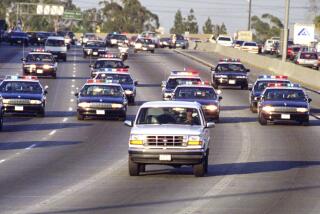TV Puts Squeeze on Reporting of Its Own ‘O.J.’ Workshop : Media: The blackout was imposed ‘to stimulate a free exchange of opinions on a controversial subject,’ the Academy of Television Arts & Sciences says.
- Share via
Finally, an O.J. Simpson story that television doesn’t want you to see.
At a time when networks and local stations are concerned about Judge Lance A. Ito’s threat to pull the plug on the camera in his courtroom during Simpson’s double-murder trial, local television officials are imposing a blackout on reporting about their own discussion today of how they have covered the case.
The three-hour session, titled “A Los Angeles Television News Workshop on O.J. . . . The Trial,” will feature a panel of about a dozen news directors, reporters and producers discussing their coverage with “comprehensive introspection, self-analysis and self-criticism,” according to a press release.
The event is being sponsored by the Academy of Television Arts & Sciences. Representatives from all the major local TV news outlets, including two Spanish-language stations, are scheduled to appear.
But although the seminar at the academy in North Hollywood is open to members of the media, event organizers have instituted a news blackout of the discussion. “To stimulate a free exchange of opinions on a controversial subject, all participants have agreed to a news blackout of their findings,” the academy explained in a news release.
The irony of the restriction, after the media have come under attack for excessive coverage of the Simpson case and Ito has expressed anger at continual news leaks that could jeopardize Simpson’s chances for a fair trial, was not lost on industry observers.
“Maybe they should invite Judge Ito to see if he can get some tips on handling the news media,” quipped Joseph Benti, a former news anchor for KCBS-TV Channel 2.
Benti, who is retired, continued: “This just points out the hypocrisy of the news media. They are supposed to serve the interests of the public, but the public is the last to know how the media operates, what the bottom line is. I understand how all trade groups have seminars, but in this case, the media is loath to let the public in on how it really works.”
Murray Weissman, a spokesman for the TV academy, said: “Yes, we agree there is an irony, but this is not a case of the people versus the media, where it is necessary to have open coverage. The academy actually would have wanted open coverage, but the panelists were brought in by the producers with the understanding that this is an off-the-record introspection.”
Weissman said that when media interest in covering the seminar grew, the producers went back to the panelists and asked if they would agree to have it covered.
“All the panelists felt that it would be too confining,” he said. “They wanted to let their hair down and just talk. They didn’t want to feel they would be getting into news bites.”
More to Read
The complete guide to home viewing
Get Screen Gab for everything about the TV shows and streaming movies everyone’s talking about.
You may occasionally receive promotional content from the Los Angeles Times.







